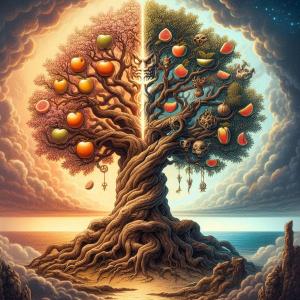
Have you ever wondered why gaining knowledge through a tree was so harmful? What deeper implications does this hold for humanity?
In my last post, I explored the potential meaning of Genesis 2:17, where God warns Adam, “You shall surely die.” Those familiar with the Bible know that the serpent assured Eve, Adam’s wife, that this would not take place, thereby challenging the Lord’s wisdom and authority.
Due to this, Eve was deceived and ate from the tree, as most of us know. But how exactly was she deceived?
In this post, we will aim to uncover a deeper meaning behind the serpent’s claim: You shall not surely die” which should also illuminate why humanity will ultimately perish through death.
In addition, by taking a closer look at the tree, the deception, and the truth, we will attempt to understand why mankind was forbidden from eating from the tree of the knowledge of good and evil to begin with and why the decision by our ancestors to eat from it mirrors what we face today.
Please note, that this is my own theory and belief based on my own study and prayer, and I am in no way seeking to force this understanding on anyone else, but rather to encourage deeper reflection of Scripture in hopes of gaining a better understanding of God’s character.
The Backstory
Upon the creation of the first human, God placed him in a garden to care for it. Though he could eat from any other tree in the garden, God made it clear that Adam and his descendants weren’t to eat from the tree of the knowledge of good and evil. God warned Adam that if he or his descendants chose to eat from the tree, it would lead to the end of humanity.
While it remains uncertain whether access to the tree was to be granted later or never at all, the command at that moment was clear: do not eat from it.
Nevertheless, Adam’s wife, deceived by the serpent, decided to eat from the tree despite knowing the command. Afterwards, she shared some with her husband, who also ate the fruit. It was then that their eyes were opened, and they now knew good and evil, and mankind would inevitably perish.
Why is this the case? What makes the acquisition of such knowledge through the tree so detrimental? How could gaining this understanding result in our downfall? Is it simply that God wants to punish us for violating his commandment? Or is there a more profound aspect to consider?
Let’s investigate further. As a starting point, we’ll examine the tree, followed by the deception that would lead to this tragic outcome.
The Tree
The tree of the knowledge of good and evil which can be literally translated from Greek as “the to-know-good-and-evil tree,” was forbidden to humankind. Let’s go a little deeper into our understanding of this tree. What does it mean to know? What is the difference between good and evil?
In the Septuagint, the word ginōskō (“to know”) can mean “to distinguish, determine, or judge.” It can also mean “to acknowledge, understand, or recognize.” The Hebrew word that corresponds to ginōskō is daath which can mean “knowledge” or “perception.”
In the context of our passage, ginōskō and daath essentially involve coming to know good and evil, being able to separate one from the other. More simply, eating the fruit of the tree would somehow create an awareness of good and evil.
After consuming the fruit, the world now, according to man’s perception, is no longer one big ball of ignorant bliss, but is divided; and when amongst something that’s divided, one must eventually choose which path to pursue. That’s where our failure lies. I’ll explain further below. But first, what constitutes good and evil?
Evil can be defined as that which causes harm, while good refers to what brings benefit. Essentially, God doesn’t give permission for evil to thrive; but rather it manifests when we neglect to follow his commandments for doing good.
But doesn’t the Bible say that God created evil?
There is a time when God creates evil (Is. 45:7), but that doesn’t mean he created some wicked force in the world responsible for all the terrible things that happen in our lives; but rather that he brings upon people what is disastrous or harmful, either as punishment for sinners or as correction for his people. I dug deeper into these concepts in a previous post. You can examine that here if you wish.
But the serpent’s words to Eve suggested that by consuming the fruit from the tree, their eyes would be opened, allowing them to discern between good and evil, or in other words, between what is beneficial and what is harmful. In this sense, the serpent was truthful. But next, is where the deception comes in.
Having established what the tree represents, let’s now delve into how the serpent’s deception unfolded, and its impact on humanity.
The Deception
Traditional interpretations, often view the serpent’s words as a direct lie. However, the way the serpent deceived Eve was not by lying but by telling the truth. He deceived her by saying mankind would not end by means of execution because God understands that whenever you eat from the tree, your eyes will be opened, and you will be like a god, with the ability to know good and evil.
The key word here is “because.” He doesn’t simply tell her, “You will not die.” No, that would be too suspicious. Instead, he makes a convincing argument to persuade her. That is, he provides the rationale for why this outcome is unlikely.
The Serpent’s statement suggests, “you will not face death, because if you are like God, or a god, with the ability to judge good and evil you will naturally opt for good over evil—like God. Thus, you will not be put to death, as your choices will consistently reflect goodness, which will please the Lord, ensuring your continued existence.”
I imagine he would have sealed the deal by saying something like, “God is only testing you. As a ruler, he wants to make sure you have what it takes to make decisions on your own, without him constantly holding your hand. All he needs is for you to take the initiative. Don’t you know that God helps those who help themselves? And thus, Eve helped herself to the forbidden fruit.
That’s the deception the enemy sold the day in the garden and the story he has continued to sell throughout the ages: You can do fine on your own apart from God. You are perfectly capable of making your own decisions. Whatever it is, just make sure you feel good about it and have peace about it. Do it your way, and God will help you when you need it.
As a result, humanity has drifted further and further away from the Lord, even reaching the extreme point of atheism, later in history. But it is man’s greatest sin to reject God, and it is the sin that will lead to our destruction.
The Truth
So, after hearing the serpent’s suggestion, the woman looked at the tree and she perceived it to be pleasant to the eyes, good for food, and fitting to make one knowledgeable. It should be noted that the Lord created the trees to be visually appealing and useful for food (Gen 2:9). However, there is no indication that he intended for people to become wise or even knowledgeable by eating from any tree.
But on her own, the woman imagined this ability or created this idea about the tree, but she did so with the suggestive help of the serpent. He puffed her up and made her believe they could do well on their own apart from God and apart from obeying his commands. Unfortunately, she fell for the deception and led mankind into a downward spiral.
The truth is, although eating from the tree would enable humanity to become aware of good and evil, it would not provide an inherent inclination to choose what is good. The fact that God declares on multiple occasions that we naturally lean towards evil shows this.
The Lord saw how great the wickedness of the human race had become on the earth, and that every inclination of the thoughts of the human heart was only evil all the time. (Gen. 6:5)
The Lord smelled the pleasing aroma and said in his heart: “Never again will I curse the ground because of humans, even though every inclination of the human heart is evil from childhood. And never again will I destroy all living creatures, as I have done. (Gen. 8:21)
Nevertheless, we persist in our belief that we know better than God, and as the prodigal son, we desire to live independently of our Father. In general, human beings want God’s blessings, but we don’t want God himself.
In fact, the entire biblical narrative revolves around humanity’s efforts to achieve goals or gain rewards by bypassing God. A prime example is idolatry, which involves seeking aid from other deities instead of the Lord.
Another example is ignoring God’s Word to elevate our own, which usually involves arrogance. For instance, King Saul disregarded God’s clear instruction, opting to make his own judgment about what was right, which led to his failure to destroy the Amalekites and their livestock, as God commanded (1 Kgs. 15).
While sparing the Amalekite king and the best of the animals seemed right to Saul, it was a direct violation of God’s instructions, which Samuel referred to as “evil” (v. 19), resulting in Saul’s downfall.
As the Bible teaches, arrogance is as the sin of idolatry (1 Sam. 15:23). That is, they both involve disregarding God’s way in favor of a distorted view of good and evil, most times, for the sake of personal gain.
Woe to those who call evil good and good evil, who put darkness for light and light for darkness, who put bitter for sweet and sweet for bitter. (Is. 5:20)
The reality is, we lack the capacity to choose good on our own without listening to the voice of the Lord. Adam and Eve’s choice to eat the fruit, while disregarding God’s instructions, serves as evidence of this fact. In the very act of eating the fruit they would have come to realize that they’d made the wrong choice by eating it. This was followed by a series of more bad decisions.
First, there was no sin in their nakedness. Yet, to mask their guilt, the first thing they did after eating the fruit and gaining insight, was to hide from God, and create coverings from fig leaves.
Up until that point, they had walked freely in both God’s and each other’s presence, unashamed in their nakedness, but suddenly they felt the need to run and hide. What changed? Nothing. Except that they had gained new knowledge that they were ill-equipped to handle. As a result, they began to call good evil and evil good. Nakedness, which God looked upon and perceived to be good (Gen. 1:31) became associated with feelings of shame and sin exposure.
Instead of choosing what was good and continuing to walk around in the nude, conducting business as usual, perhaps even confessing their sin to God, they chose to do what was harmful. Why was it harmful? Because first, they felt a need to hide themselves from their Creator, the only one who could offer them direction.
Second, they used fig leaves which I imagine had to be many leaves woven together to make “somewhat” adequate coverings. The fact that the coverings were made of mere leaves would necessitate frequent replacements. This could disrupt the tree’s natural cycle, as its leaves are vital to its health, and removing too many could lead to stress or even death for the tree (ref. https://www.britannica.com/science/leaf-plant-anatomy).
Third, because that wasn’t a sufficient cover, God took the only thing available at the time that was sufficient to keep them covered and that was the skin of an animal. And the animal had to die.
Finally, by hiding because they were naked and making coverings from the leaves, they were essentially saying that God’s way was wrong. When God created them both they had no clothes. Had he wanted them to be clothed he would have thrown some coverings on them, but he didn’t. Therefore, this was the beginning of man deciding to choose his own way—what he believes to be right based on his own understanding rather than God’s.
They chose what was evil or harmful and all of it was unnecessary in the first place. It was non- beneficial and non-productive. It was the start of humanity using its knowledge of good and evil, to choose what was evil. God in his wisdom and omniscience, must have known this would happen and knew it would become a continuous pattern (Gen. 6:5; Gen. 8:21).
That being said, I believe that when God says “You shall surely die” he’s not threatening Adam but declaring to him what will happen. As a result of eating the fruit, you all will certainly die. Not because we ate the fruit and now God is enacting some sort of punishment, as we often teach, painting God in a petty light.
But because he knew that if we had this knowledge, understanding, and ability to decide good and evil, apart from him we wouldn’t have the wisdom or heart to use it properly, which would lead to our demise.
Why Would Mankind Die?
I believe that the tree of the knowledge of good and evil served primarily as a test of obedience; it resembles the moment when the adversary tempted Christ to forsake God’s path in favor of a quicker, easier route to the kingdoms of the earth, which God had ultimately intended for him (Matt. 4:8-11; Rev. 11:15). However, it was essential that this be done in God’s way.
Another parallel can be drawn from Jesus’s story of the prodigal son. The prodigal son longed to break away from his father, essentially ending their relationship. He had no intention of serving his father until it was time to rightfully claim his inheritance.
Instead, he demanded his inheritance ahead of time and left his father’s household. Having received the blessing prematurely, he wasn’t mature enough to know what to do with it. His foolishness and pride would have caused him to perish if he hadn’t come to his senses, returned to his father–his provider– and resolved to serve him faithfully (Lk. 15:17-20) (an illustration of “repenting”).
In a similar vein, Adam and Eve faced the same temptation, which even Christ experienced during a time of anguish; (Lk. 22:42; Matt. 26:39) they were tempted to pursue an easier, quicker path to receive the Father’s blessing. In their case, the blessing would have been knowledge and wisdom. Why are these important?
To govern the earth, humanity must decide what is beneficial and what is not according to God’s standards, enabling us to make choices that align with his will. This is, after all, the essence of ruling. It requires wisdom, which involves the ability to make sound decisions.
Ironically, true wisdom comes from God (Prov. 1:7; Prov. 2:6; Prov. 3:7; Prov. 13:1; Ecc. 2:26; 1 Cor. 1:25; Prov. 9:10-12; James 1:5). While one may have knowledge, the ability to choose wisely cannot exist apart from God. This essential quality for rightly governing God’s creation can only be attained through listening to, obeying, and learning from him. That’s the reason we’re here.
Now all has been heard; here is the conclusion of the matter: Fear God and keep his commandments, for this is the duty of all mankind. (Ecc. 12:13)
I don’t think it was ever about the tree but about testing the heart of man. By neglecting God’s instructions and eating from the tree, humanity would have shown itself to be flawed, revealing a lack of trust in the Lord, as well as a failure to fear, respect, and acknowledge him. The Lord surely foresaw the potential consequences of this choice.
If we could blatantly disobey him for some fruit, being aware of the consequence of death, what greater evils would we be capable of? Fast-forward several thousands of years and look at our world today to get your answer.
Without reverence for our Creator, humanity would reach a level of depravity and wickedness from which there would be no return—not due to an inability to return, but rather a disinterest in doing so, as we would likely choose our own desires over God’s.
The truth is, God doesn’t separate himself from us. Throughout the Scriptures, he persistently reaches out, urging people to return to him. It is our sin—our own actions, and the pursuit of our own desires—that create a divide between us and the Lord.
We distance ourselves and fail to recognize him because we choose to ignore his guidance in favor of our own ways. All other purported reasons as to why one refuses to serve the Lord, are merely excuses to mask this self-serving motivation.
We aren’t in our current condition just because of Adam and Eve but because each of us are inclined to choose evil from childhood and we easily influence others who come after us. Thus, all of us have sinned and fallen short of God’s standards and none are worthy of partaking of the tree of life because none have been, or will be, entirely faithful and obedient to God in our present circumstances.
Humanity is too far gone in our separation. We became separated from God by separating from his teachings. Obeying his teachings is what brings life (Deut. 30:19). Therefore, when we turn away from God, we lose our right to partake in his life. In the absence of life, there will eventually be death. I believe this is what the Lord was trying to spare us from. This pattern which began with Adam and Eve would continue with the rest of mankind and it would lead to our destruction.
But there is no doubt in my mind that our fate would have been different if mankind had humbled itself and returned to God as one. Upon further reflection, I’ve come to realize that “You shall surely die” was indeed a guarantee, but one that was conditional. What do I mean by this?
Persisting in sin would lead to death, as it was predicted. If we returned to God, however, we would live. This reflects God’s true character, who doesn’t want anyone to perish.
When I say to a wicked person, ‘You will surely die,’ and you do not warn them or speak out to dissuade them from their evil ways in order to save their life, that wicked person will die for their sin, and I will hold you accountable for their blood. But if you do warn the wicked person and they do not turn from their wickedness or from their evil ways, they will die for their sin; but you will have saved yourself. (Ezek. 3:18-19)
He prayed to the Lord, “Isn’t this what I said, Lord, when I was still at home? That is what I tried to forestall by fleeing to Tarshish. I knew that you are a gracious and compassionate God, slow to anger and abounding in love, a God who relents from sending calamity. (Jonah 4:2)
Unfortunately, humility wasn’t, and will never be the case in this world. Mankind has become habitual in our sin, and we have collectively turned away from the Lord. People have become altogether unprofitable to God and destructive of the rest of his creation which includes causing harm to each other. Should God allow this to continue for eternity?
Therefore, to prevent mankind from continuing to live in this state forever, the Lord cut us off from the life-preserving tree and eventually we will come to an end. (Gen. 3:22).
Then the Lord said, “My Spirit will not contend with humans forever, for they are mortal; their days will be a hundred and twenty years.” (Gen. 6:3)
Humankind would become extinct as a species. The only practical solution would be to eradicate what is flawed in order to create something new. The first step in completing this was to implement a separation from life so that death could take place. My previous post outlined my theory about this, including Noah and the Ark, so I won’t repeat it here.
But in a sense, physical death would come upon mankind as a result of us dying figuratively—that is, mankind becoming unprofitable and corrupt. We would altogether become worthless and unfit to partake from the tree of life and live forever.
God foresaw the arrival of this moment. He was aware of what lay within our hearts, yet he tirelessly sought to save us before we faced destruction for the chaos we’ve inflicted upon the world and each other. Would he be wrong to wipe us out? Not at all. He is a fair and just God, fully entitled to take such measures. Eventually, we will meet our end by his command.
Yet, in his mercy, he has decided to spare some—not because of a divine lottery where a few fortunate souls are randomly selected for salvation; but because of our trust in him as the sole God, our efforts to follow his ways, and our sincere longing to be in his presence. His desire is for us to live, not to perish. He is a compassionate and merciful God.
And he passed in front of Moses, proclaiming, “The Lord, the Lord, the compassionate and gracious God, slow to anger, abounding in love and faithfulness, (Ex. 34:6).
But you, Lord, are a compassionate and gracious God, slow to anger, abounding in love and faithfulness. (Ps. 86:15)
You, Lord, are forgiving and good, abounding in love to all who call to you. (Ps. 86:5)
Summary
Although humanity would gain the ability to choose between good and evil, it doesn’t mean we would do so correctly. The Scriptures teach that a path may seem right to a person, yet its ultimate outcome is death (Prov. 14:12). This is a path traveled without God.
Many today reject God to follow their own way or chase after worthless idols. In addition to harming and destroying the earth, humankind continually hurts and destroys one another.
I believe God saw the evil we were capable of, but still gave us a choice to reveal what was truly in the heart of man—whether we’d be worthy to continue partaking of the tree of life by fully trusting in him and his guidance, or whether we’d so easily turn aside and go our own way. Sadly, we disappointed (Gen. 6:6), trusting in creation rather than the Creator for knowledge and truth.
Wisdom and knowledge were never meant to come instantly from a tree, but gradually from the mouth of the Lord through his teachings (Prov. 2:6). This is evident throughout Scripture (Ex. 18:13-27; Ex. 24:12-18; Lev. 10:11; Deut. 6:6-7; 1 Sam. 12:23; Isaiah 30:21; Prov. 1:8-9; Ps. 32:8; Matt. 5:19; Matt. 28:19-20; Acts 5:25; Eph. 6:4).
Without the teachings of God, everyone would act according to their own definitions of right and wrong, driven by personal desires and understanding. We would distort the truth and do what is right in our own eyes. I believe this happened with Adam and Eve and has continued ever since. Despite knowing that good and evil exist, we struggle to differentiate them without God’s guidance.
Because we often reject God’s guidance, evil and wickedness abounds. If the corruption today grieves us, as it should, imagine how deeply it must grieve God. Should he endure this for all eternity? He should not and will not. This is why the human race will perish. We were not designed to function this way, and we show no signs of changing.
So, humanity would end not over a piece of fruit but because our disobedience showed we are flawed, risking death itself over a desire to be like gods and to act independently of the Lord.
I acknowledge that some believe the story of Adam and Eve is metaphorical, illustrating a truth. But the fact of the matter is, whether it is a story to illustrate the condition of humanity or a true account of historical events, the truth is still the same. Humankind left the intended purpose of God to go our own way, and the result will be our destruction.
However, those who strive to do the Lord’s will, will be preserved (“saved”) in the last day. By placing their trust in God through Jesus Christ, they will inherit the new earth and have access to the “Tree of Life” to live fully as God intended.














